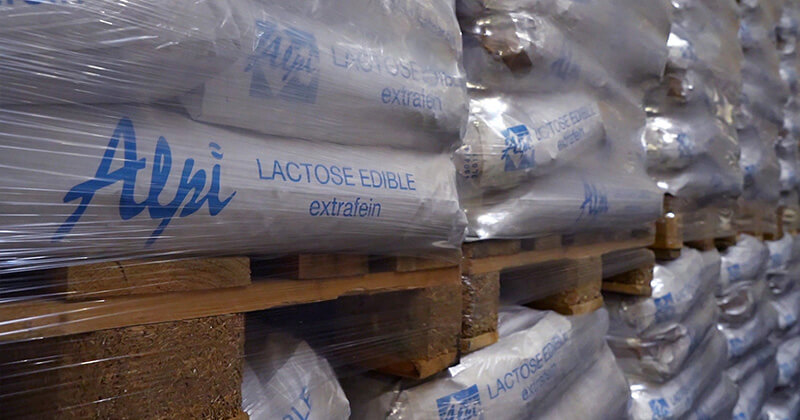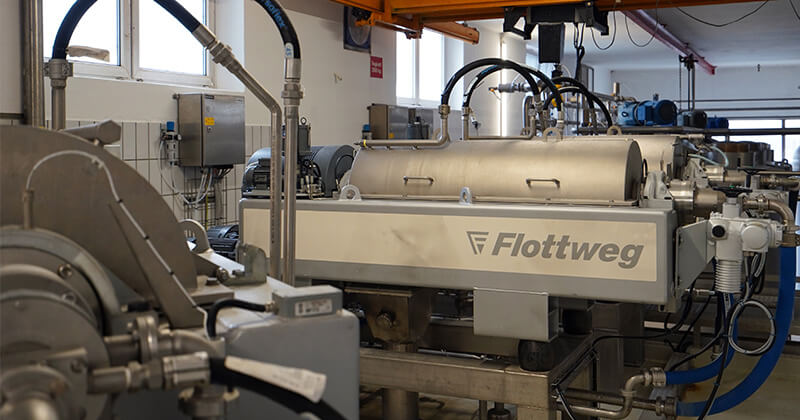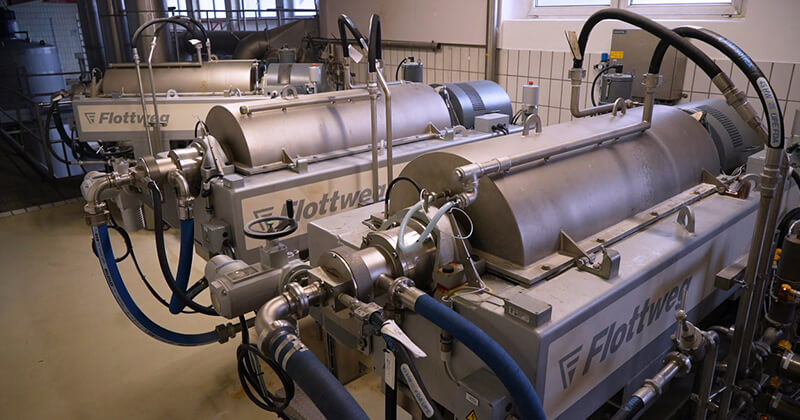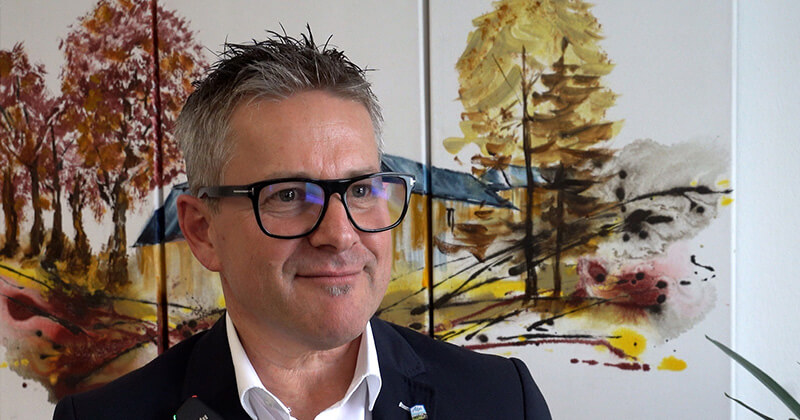2025-09-29
25 years of success: Alpi modernizes its lactose production powered by Flottweg decanters
To make their production more efficient while also improving their ecological footprint, Alpi, an Austrian milk drying plant, is modernizing its lactose process with the help of sophisticated Flottweg decanters. The result is a three-stage washing process that saves water, increases product yield and provides economic added value. Alpi and Flottweg have been partnering to improve processes for more than 25 years. The Flottweg decanters are the key technology used for the production of lactose at Alpi. Thanks to the expansion and modernization, the process is now significantly improved in both economic and ecological terms.
Alpi's focus: Whey and lactose
Alpi is an Austrian dairy company that specializes in the processing of whey and the production of lactose. Alpi currently has around 50 employees and is the largest milk drying plant in Austria in terms of volume.
The focus of the business is very clear. “Our main product is sweet whey powder, most of which is used in the chocolate industry. The second most important product is lactose, i.e. milk sugar. We also produce partially desugared whey powder, which is largely used in the feed industry,” explains Managing Director Karl Himsl. “In total, we produce 33,000 metric tons, of which over 20,000 tons are sweet whey powder, 7,000 tons are lactose and approximately 5 to 6,000 tons are partially desugared whey powder. We also sell whole milk powder, skimmed milk powder, casein and other by-products.” Alpi adapts the powder–from fine to extra fine–individually to customer requirements.
 Alpi sells whole milk powder, skimmed milk powder, casein and other by-products.
Alpi sells whole milk powder, skimmed milk powder, casein and other by-products.Three-stage lactose production process using Flottweg technology
For the production of lactose, Alpi receives whey from cheese dairies in Austria and Germany. This is then ripened and crystallized on site, considering various factors such as pH, temperature and composition. In general, the production of lactose involves a three-stage washing process. The first step in the process is separating the crystallized lactose from the parent solution. Cold water is fed in during washing to remove impurities, including protein, lactic acid and minerals. The last step in the process is the second wash, which is designed to produce the purest and best possible end product.
That is why Alpi has partnered with separation technology specialist Flottweg for 25 years and counting. Managing Director Himsl describes the manufacturing process at Alpi as follows: “The first decanter separates the product stream into sugar molasses and partially desugared whey powder, which is still liquid. At the second and third decanter, the sugar molasses is further washed and made increasingly solid. After the third decanter, the product goes directly to the fluidized bed dryer via an Alexander mill, where it is dried into a powder.” The three-stage washing process is realized with Flottweg decanters.
 Flottweg and Alpi started their cooperation in the early 2000s.
Flottweg and Alpi started their cooperation in the early 2000s.It is particularly important for the production process that the lactose contains as little protein as possible. The protein must be separated out with the second phase, the partially desugared whey powder. For this reason, it is very important that the washing process functions consistently and that the separation process in the first decanter is already as efficient as possible.
In addition, Alpi processes different types of whey, which means that the process is always different. For Alpi, this makes the individual adaptability of the decanters particularly important. “With the Flottweg decanters, we can store different recipes, which helps us to ensure that our processes run perfectly and that the separation is exact,” says Himsl. “Flexibility is crucial for us because we have to work with different types of whey in order to always get the perfect end product.”
25 years later: A collaboration that has grown over time
The partnership between Alpi and Flottweg has grown ever stronger over the last quarter century. The company started with one decanter in 2000, and it eventually purchased a second one to enable a two-stage washing process. Since then, Alpi has been extremely satisfied with the collaboration, as well as the performance of the decanters. “It always works great, and we are impressed by the quality. The cooperation with Flottweg has always gone extremely well,” says the managing director.
For this reason, Alpi eventually decided to update the process—together with Flottweg. Based on its positive experiences through the years, Alpi again decided to go with Flottweg. “In the end, we decided to buy three new decanters to keep up with the latest technology and to get the most out of our production. Alpi has decided to gradually replace its old decanters, as they are no longer state of the art.”
In addition, the switch to the three-stage washing process has resulted in a further benefit for Alpi. “In the separation process, we now have much more protein in the higher-quality, partially desugared whey powder and much less in the lactose—just as we need it. This additional protein in the partially desugared component sells very well.” This provides an added economic benefit for the company, since the higher-quality, partially desugared whey powder can be sold at a higher price.
When selecting the new decanters, Flottweg’s expertise was also key. Alpi decided on a special type of material for one of the decanters. “When we switched to different varieties of acid whey, it became particularly important to have a very good separating decanter that could also handle a low pH value. During the planning phase, we received excellent advice from Flottweg. They recommended that the first separating decanter be made from the Super-Duplex material to handle the acid whey. For the manufacturing process and for product safety, it was also crucial that the devices run reliably in the long term to avoid jeopardizing our production. This advice strengthened our relationship with Flottweg.”
 Alpi is impressed by the good separation performance and reliability of the machines.
Alpi is impressed by the good separation performance and reliability of the machines.Three-stage process ensures efficient product yield and quality as well as water savings
The decision to modernize the processes and install a further washing stage is yielding positive results at Alpi. Lactose production has doubled, while the number of staff involved has remained the same. The quality of the lactose has also improved as a result of the switch to the three-stage washing process with the Flottweg decanters.
What’s more, water consumption has been significantly reduced. “Thanks partly to the three new decanters from Flottweg, we now need much less wash water in the process. We save about 50 percent of the water we used previously. This water also must be evaporated later,” explains Himsl. “In the past, the syrup came out of the decanter with 5 to 6% dry matter, and now it comes out with 14 to 17% dry matter. The partially desugared molasses was previously 22% dry matter, and now it yields 36 to 39% dry matter. Now we save not only water but also energy, as the product now comes out of the decanters with much higher dry matter, which helps us to save on thickening costs.” These were important steps for Alpi to minimize its carbon footprint and embrace the all-important topic of sustainability in its operations. For this reason, Alpi has received funding from the Austrian Federal Ministry for Climate Action, as these improvements have been classified as innovative.
“The service is truly excellent”
Alpi has received positive experiences with Flottweg’s service. Through the past 25 years, the service aspect of the partnership has always run smoothly and without issue. Due to the perishable nature of the whey and the 24/7 production, it is of great importance to Alpi that all processes function reliably and without unexpected stoppages. With the Flottweg decanters, Alpi has found a partner that meets these requirements and enables it to produce around the clock.
To optimize maintenance times, Alpi also decided to purchase a spare rotor. “Previously we had to schedule one or two days for maintenance. Now we can replace the rotor in about an hour and a half and the process can resume quickly,” explains Himsl. This shorter maintenance interval means that production can now be restarted on site more quickly.
 Karl Himsl is convinced about the Flottweg service and cooperation.
Karl Himsl is convinced about the Flottweg service and cooperation. Conclusion: Won over by Flottweg’s decanters
Thanks to its long-standing cooperation with Flottweg, Alpi has not only benefited from a custom-made and flexible technology, but also significantly improved the efficiency and sustainability of its production processes. The decision to buy the new Flottweg decanters, supported by sound advice from the experts, led to significant efficiency gains in the three-stage washing process. Particularly noteworthy are the positive effects on product quality, as well as the savings in energy and resources that help Alpi to achieve its sustainability goals.
Karl Himsl emphasizes: “The key advantage of Flottweg decanters is that the company works with you to find custom-made solutions that are both high-quality and reliable.” The flexibility of the Flottweg separation technology enables Alpi to process different types of whey efficiently and allows them to always achieve an optimal end product. The 25-year partnership has proven to be crucial for the success of the company. Innovation, continuous improvement and the close partnership with Flottweg have not only helped Alpi to successfully modernize, but have also contributed to optimized production processes and shorter maintenance times. As a result, Alpi will remain a competitive and sustainable player in the dairy industry in the future.
Author: Julia Deliano, PR and Content Manager at Flottweg
